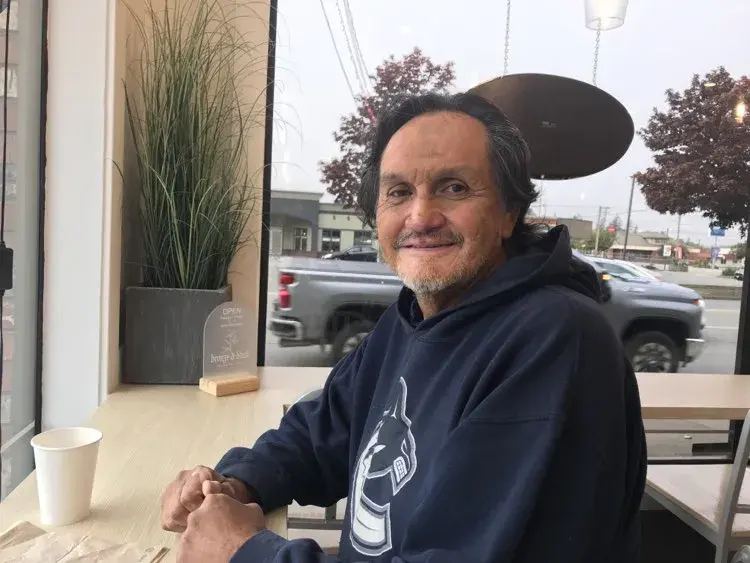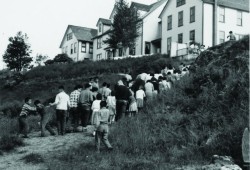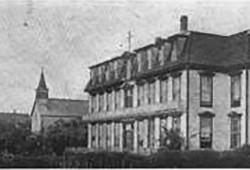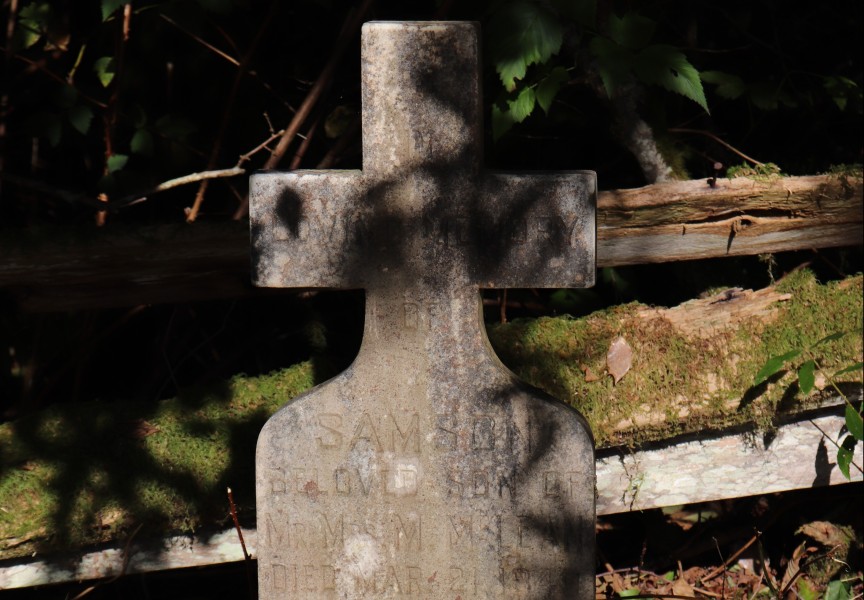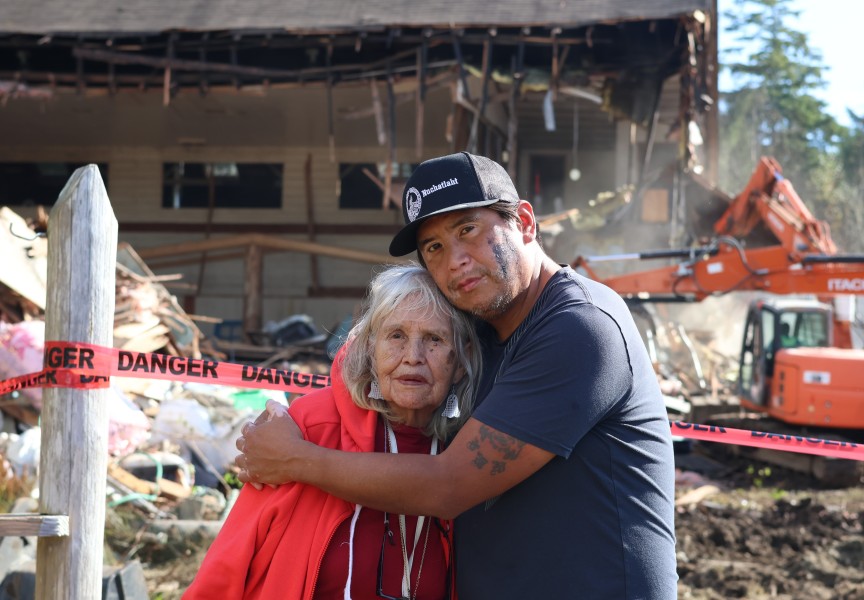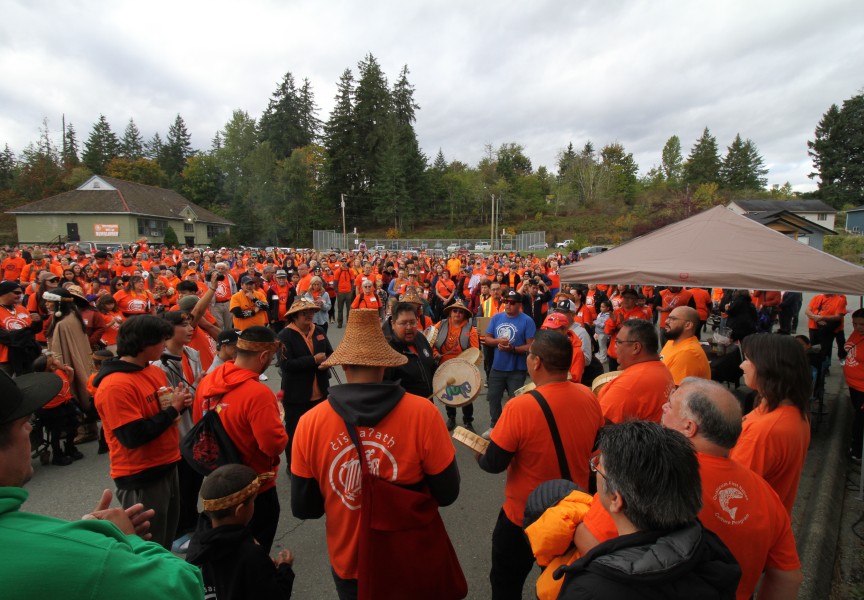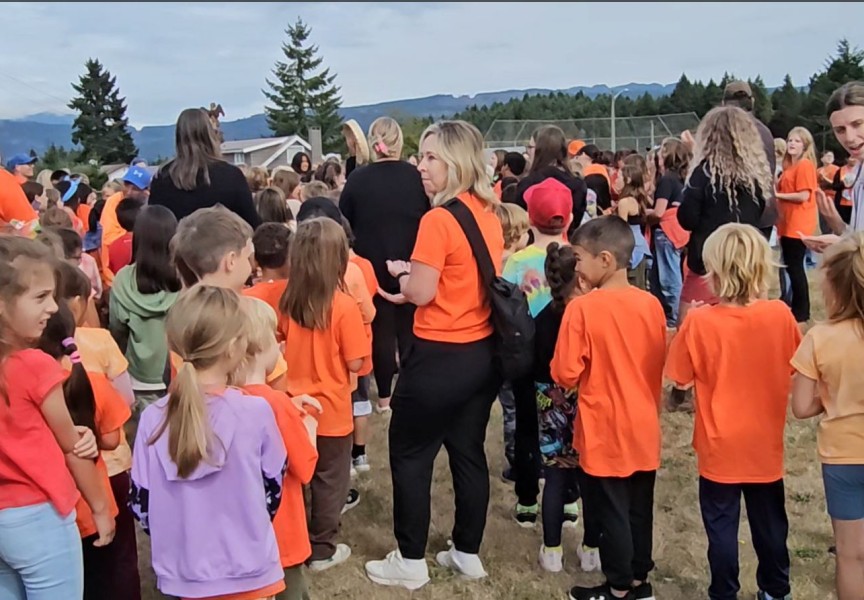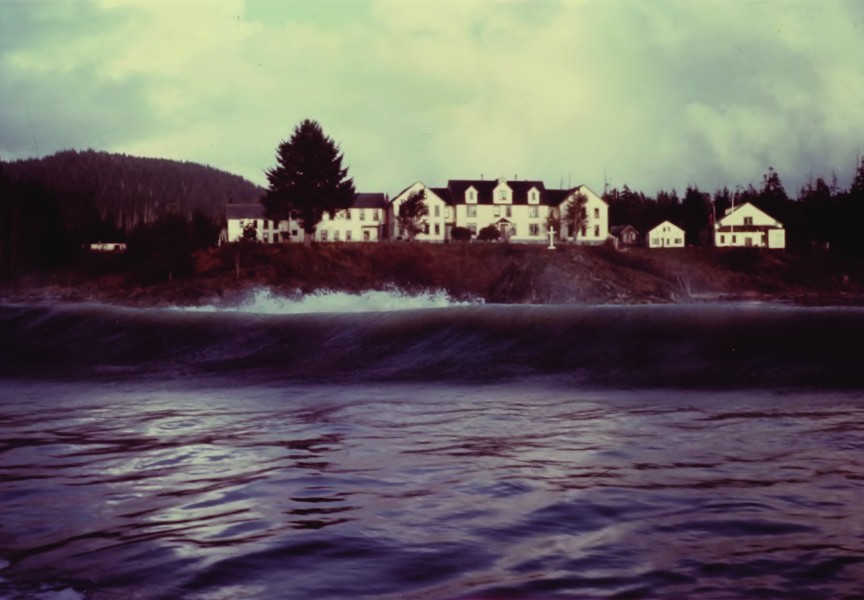When he was about 16 Lyle Billy was travelling alone on a bus from Gold River to Victoria. In his pocket was an address for a home in upscale Oak Bay, a neighbourhood he had never been to.
“Here we go again,” thought Billy at the time. “There was nobody there to help me, there was nobody there to give me directions. I was just on my own.”
With no one meeting him at the bus depot, the teenage Billy had to somehow find his way to the Oak Bay home, where he would reside as a boarder while continuing high school. There were two other Aboriginal boarders there.
“It was the weirdest place,” recalls the Ehattesaht member. “We weren’t allowed in the kitchen, not even to bring in our dishes to the sink, we had to leave them on a little TV table in the living room. We sat on the couch, and the couch was covered in plastic.”
“We weren’t allowed to sit on the other couches, just the plastic-covered one,” he added.
A growing teenage boy, Billy recalls being hungry sometimes, as the boarders weren’t allowed snacks after school. But the hosts always prepared lunches for the boys to take in the morning.
“I never saw the people, it was weird,” says Billy. “I had to find my way to the high school.”
This was one chapter amid a nomadic youth. After spending his early childhood with parents in Queen’s Cove and Ehatis, the government-ordered succession of relocations began with a four-year stint at Christie Indian Residential School. Billy got to stay with his parents for Grade 6, where he could walk to the local school in Zeballos, but after a year an Indian agent ordered him to move again, this time to the Lower Mainland to live at the St. Mary’s Indian Residential School in Mission.
Then at the age of 13 Billy was sent to live with the family of a United Church minister in Tahsis.
“They were pretty good to me. They took me on field trips, they didn’t leave me at home,” he remembers.
At that time he was the only First Nations student in the local school, where most of the children were friendly, except for a bully.
“Had a few run ins with him,” says Billy. “A lot of the kids were really friendly, I made a lot of good friends there.”
Billy returned to Zeballos to live with his parents for Grade 8, but the same Indian agent eventually discovered this, sending the teenage boy to the anonymous hosts in Oak Bay. Several other boarding homes followed, most being better than the Oak Bay residence.
“I wound up staying at this place where my nephew was,” recalls Billy of another boarding home in Victoria. “The guy, he was in the Navy, so he was never around. And the lady, she had two kids, so she was always busy with them.”
“She cooked for us when she could. She made a nice lunch and stuff, but she was mainly taking care of her own kids,” he says. “I was able to go into the kitchen and make myself a snack.”
‘Totally in the dark’
As he fondly remembers his family’s home, where he spent the best years of an otherwise itinerant youth, it was never explained to Billy why he had to keep moving. Like thousands of people in his generation, he was subject to the Indian Boarding Home Program, a federally mandated initiative that ran 1951-92. The program entailed Indigenous children being moved from their on-reserve homes to live in households in another community where a school was nearby. Host families received a monthly payment to take in the children.
“The start of it was largely because the Indigenous communities ran out of schooling,” says Darrin Blain, a lawyer with Eagle Nest. “They didn’t have a junior high or they didn’t have a senior high, so the kids had to go somewhere. That was the thinking.”
But Billy did have a school near his family’s home in Zeballos, something that continues to confound him to this day.
“I’m totally in the dark, there was no information,” he says.
Billy encountered some prejudice during his years as a boarder, like an elderly host couple’s adult son who threatened him. Others in the boarding program faced worse abuse.
“There’s a lot of people who talk about this cultural shock, this going to a non-native family’s home, not being treated respectfully or properly,” says Blain, who is collecting statements from former boarders for a class action settlement. “The stories vary from, ‘I really liked it. I was fed three wonderful meals a day and they were really, really nice people and I got an education’, to horrific stories of physical, cultural and sexual abuse. Unfortunately, on the Island, the claims, I think they’re worse out there.”
In June 2023 the federal government announced that the Percival class action had reached a settlement, after a growing number of former boarders were able to convince the Federal Court of the historical injustice of the relocations. Ottawa has so far announced a $50 million investment in “commemoration, healing, language and culture”, but with 40,000 possible claims, the total value of the settlement has been estimated to be as much as $1.9 billion.
“These children, now adults, recount stories of isolation, and many who returned to their family home years later report no longer being able to connect meaningfully with their community,” reads a Federal Court decision from Justice Peter Pamel. “[T]heir stories speak of an entire generation of Indigenous children being severely damaged – physically, emotionally and psychologically – losing their culture, language and connection to family and community.”
“We’ve got clients who were young mothers, impregnated by the people who were supposed to care for them,” notes Blain. “You’ve got some really talented people and some really, really beautiful people, and just trashed by the system.”
The case was brought forward by Reginal Percival, who has advocated on the matter since 2006. Born in Gitlaxt’aamiks in 1955, Percival’s parents hid him from federal agents to avoid residential school. But one week after Percival’s father was killed in a logging accident, at the age of 13 the boy and 500 other Nisga’a children were sent on buses from their home in the Nass River valley to Vancouver, where they would be matched with boarding families.
Court records recount Percival’s host family often saying they “were getting back their taxes” by taking in boarders.
“When Mr. Percival first met them, they threw his bag in the back of their pickup truck and told him to climb in the back with his bag,” states court records. “Mr. Percival’s boarding home parents discouraged any contact with his family and denied Mr. Percival any reasonable opportunity to practice his Nisga’a language, culture, customs, heritage and traditions. He was also denied any reasonable opportunity to practice his Aboriginal rights as a Nisga’a member.”
Years of discrimination and abuse followed at Johnston Heights Secondary in Surrey, where Percival wasn’t allowed to play sports. He turned to alcohol to deal with his pain, according to court records.
Fortunately for Billy, while away from his family he found a refuge in basketball, and even joined The West Coasters during a stint in Nanaimo, playing with other boys from Hesquiaht, Ahousaht and Ehattesaht backgrounds.
“We formed a team, and we played in a lot of tournaments up and down the island. It was awesome,” remembers Billy. “I really got into sports to occupy my time.”
A life-changing ultimatum
Despite the hardship of his adolescence, Percival went through post-secondary studies, and got a job with the Union of BC Indian Chiefs. At 34, he finally returned home to live in Gitlaxt’aamiks again when he secured a position with the Nisga’a Health Authority.
Billy also found a career as a young man. The tide of his youth changed partway through Grade 12 with the passing of his mother. He returned home to Zeballos, and had been in the family home for a month when his older brother Arthur gave him what would turn out to be a life-changing ultimatum.
“He said after dinner one night, he said, ‘Look it, I don’t want to see you laying around on the couch. I don’t want to see you doing nothing. There’s only two ways this can go: You either get your ass back to school, or you look for a goddamn job’,” recounts Billy. “He didn’t sugar coat it.”
The younger brother wrote a resume on a piece of paper, and brought it to the office of the local logging company. The next morning his brother came home to tell Billy he would be starting work the next day. Billy filled the role of a choker, which entailed scrambling through fallen timber to attach a cable so logs could be pulled up by a machine.
“I entered into a whole new world,” says Billy. “I was able to learn off of my older brothers. They taught me a lot.”
Looking back on his youth, the 69-year old recalls a tumultuous 12 years – except for two months each summer and the two years he was able to live at home with his parents. Ironically, he credits the most frightening times of his childhood at residential school for instilling a sharp listening ability.
“I figured out the way to stay out of trouble was to do the work, then you’re not getting strapped, because I saw so many of our people getting strapped with the ruler or the yardstick,” he says.
Compensation for successful boarding home claims ranges from $10,000 to $210,000, depending on the severity of abuse suffered. To be eligible a claimant must have lived with a host family that received federal funds for the Indian Boarding Home Program, and this excludes provincially funded child welfare placements. Those interested in making a claim can contact Darrin Blain at 1-888-654-5291.

